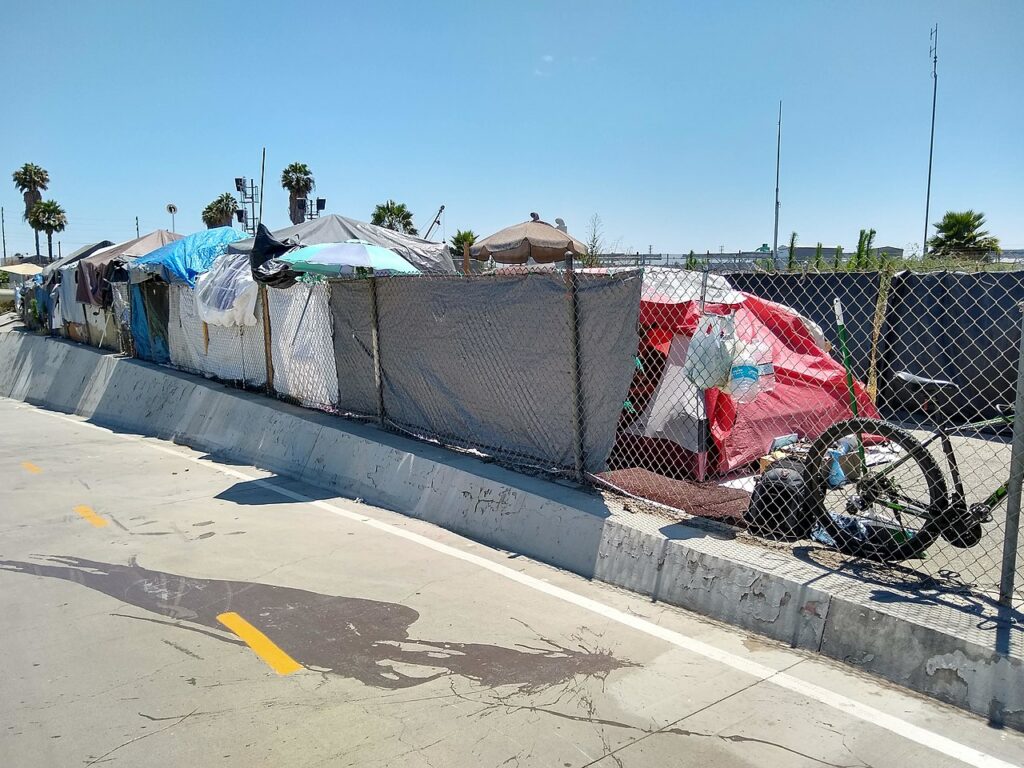A woman who dubbed herself the “Governor” Los Angeles’ infamous homeless district, Skid Row, is fuming that the city bulldozed her luxurious sidewalk dwelling, a week after she showed it off on social media.
“They targeted me. They came straight to me with bulldozers. That’s not a routine cleanup to come with a bulldozer,” Stephanie Arnold Williams told LA Magazine.
A week before her home was seen being demolished by a dump truck with a crane, she criticized the government for their handling of the homeless crisis.
In a viral video posted on Twitter, shared a glimpse into Skid Row’s most tricked out tent.
“Every person should have one… You might as well do it right,” Williams bragged while touring her insane abode.
Her tent had not one, but two queen-sized beds, a kitchen, a portable toilet and a walk-in closet.
Solar panels and a generator powered her gas stove and an actual inflatable hot tub.
In the video, Williams referred to her street abode the “White House,” because she acts as the area’s unofficial governor.
“I call it the White House because the government’s not doing their job correctly so I’m here to show them how to do it,” she criticized.
“They just sit at a round table and talk about stuff that don’t work,” she remarked about politicians.
Williams said her role as Skid Row’s unelected leader involves providing tents to people waiting housing, which the county has a $1.2 billion budget to build.
LA Mayor Karen Bass vowed to get 17,000 homeless people off the streets and into housing during the first year of her term.
A February 2022 report by the Los Angeles Homeless Services Authority found that despite the visible over abundance of homeless encampments in the county, their numbers had only increased by 4.1% since 2020.
Los Angeles county is home to to 69,144 of California’s population of nearly 100,000 unhoused people.
The report’s authors touted how pandemic era policies prevented a surge in homelessness, but homeless advocates claimed that their numbers were off by a significant amount.
A volunteer that helped perform the homeless head count during the three night census in February 2022, said that 297 people were living in the area she surveyed, but the report reported none.
“LAHSA did not get the count right. Nowhere close. Nowhere near,” volunteer Jessica Rogers told a local news station.
She said that an app the surveyors were using to submit their findings crashed, but she had sent in her count by text.
“I remember very well what I saw and where I saw it and what it was like,” Rogers commented.
“And to find out that LAHSA recorded zero people on the streets that night is heartbreaking and gut-wrenching.”
Last week neighboring Culver City voted to ban encampment dwellers from setting up on area sidewalks.
The policy change will go into effect once there 100 beds available through the city’s various housing programs.
Culver City Councilman Dan O’Brien said the law was created to encourage area vagrants to utilize the city’s designated homeless areas and programs.
“The desire on our part is that this ordinance will help give them that little extra push to accept the housing and services that we are offering,” he told the LA Times.
One decade-long resident expressed his dismay about being evicted from his pop-up homestead.
“They can’t take my tent,” he insisted. “That’s my personal property. I’m not going anywhere.”
Williams found out the hard way that city officials can and will take her belongings, and clear out her tent whether she agrees to it or not.
The former street glamper was given 30 minutes to get her valuables out of the tent, even though she insisted that her neighbors across the street were told about their eviction from the encampment two weeks prior.
She claimed that a group of law enforcement officers surrounded her encampment and tossed her stuff.
“They took my blankets, my contact lenses, all my food,” Williams detailed. “They threw away pots and pans and cups and things I needed to eat.”
A Department of Public Work spokesperson said that her belongings were not thrown out, and were available for pick up at a local storage facility.
“They didn’t offer me housing,” Williams said about the eviction. “They didn’t offer me anything.”
A witness to the incident described the process as a “calculated” move by city authorities.
“You had no less than 12 to 15 cops, you had heavy equipment and the [sanitation crews] came out to essentially demolish that corner while letting the tents across the street remain,” they explained.
Williams is particularly pressed by the demolition, because she built her tent encampment on a mobile platform.
“I put wheels on my house so that you can clean underneath. I’m the one that gets on my hands and knees and scrubs this ground with a mop,” she said in an interview.
“I use a toothbrush to get into cracks. There’s not even a cigarette butt on this ground. I’m the best cleaner.”
Her home was the prototype for a housing model that she wanted to replicate for other Skid Row residents.
“I was going to start building it for the homeless. They don’t want tiny houses here,” Williams concluded.
She is currently residing in a local hotel, but plans to move into a new set-up in a nearby parking lot.

